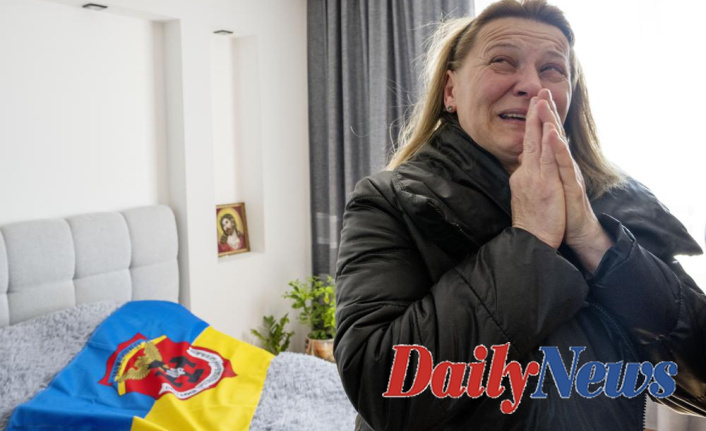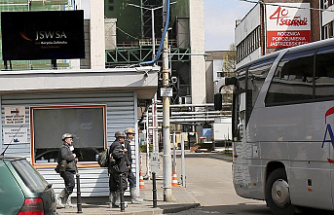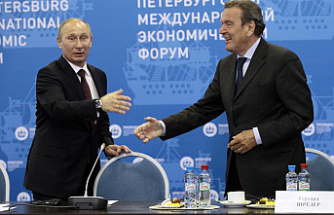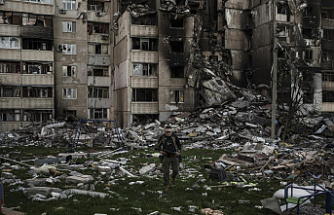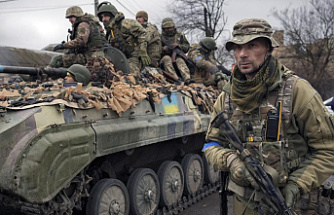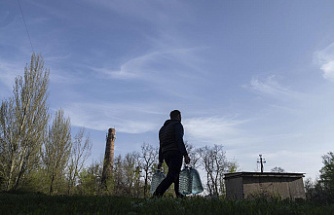The fields of the Pavlovych family are still intact in this lonely landscape of churches and checkpoints.
Roman, the 25-year-old son of a soldier, was killed in the siege city of Mariupol. This news was first reported by the family over a week ago. Roman, the father of the family, will be leaving for war on Tuesday.
"The frontline is full of our finest people. Maria, the mother, said that her son's best friends are now dying. She sat in tears in the bedroom of her son in warm brick house, her medals and photos spread out in front of her.
The Pavlovych family is aware of a second front in Russia's war that runs through western Ukraine's farmland, far away from the daily resistance to the invasion. It is a difficult battle for farmers to feed their country .
One third of world wheat and barley exports go to Russia and Ukraine. This leaves millions in North Africa, the Middle East, and other parts of Asia without access to affordable bread and noodles. The conflict has created the possibility of food shortages in Ukraine and political instabilityin other countries that rely on Ukrainian wheat such as Indonesia, Egypt and Yemen.
With the war raging, it is not clear how many farmers will have the ability to plant and tend their harvests. Pavlovych was forced to the frontlines. The challenges continue to grow.
Infrastructure, from roads and ports to farm equipment, is in chaos and damaged. This makes it difficult for critical supplies like fuel to be obtained and export routes almost impossible to reach. The fighting in the vicinity has paralyzed fertilizer producers, which could lead to a longer winter that may affect spring yields.
"How can we sow when the enemy deliberately mines the fields, destroys fuel bases?" In a recent speech, Volodymyr Zelenskyy, Ukrainian President, stated that it was difficult to sow when the enemy intentionally mines the fields and destroys fuel stations. "We don't know what harvest we'll have or whether we'll export it."
A bombing raid on an airport near Pavlovych's home resulted in unexploded ordnance being sent into nearby fields.
Last week, you could hear the thudding sounds as the authorities tried to dispose of the ordnance. This was right beside the young Pavlovych's grave.
Even though families are grieving, there is no time to waste. Ivan Kilgan is the head of the regional agricultural association. He said that the northwestern Lviv region, near the border to Poland, is being asked not only to plant as many fields as possible, but also to avoid the heart of what is known in the south as Ukraine's breadbasket.
However, it won't be possible for the region to return to pre-war levels.
"We expect to produce more than 50,000,000 tons of cereals. We used to produce more than 80 millions tons of cereals. It's logical. Kilgan stated, "Less land means less harvest."
Kilgan stood in a cold barn that contained more than 1,000 tonnes of wheat and soy. He vowed to send tons to Ukraine's army. Kilgan plans to plant 2,000 hectares, or nearly 5,000 acres, this year. This is an increase from the 1,200 hectares that he planted last year (around 3,000 acres).
Yet, he is short of fertilizer. He needs to double his 300-ton fertilizer supply in order to produce the extra production he wants.
Kilgan stated, "If the world desires Ukrainian bread, it must help with this." He showed him blueprints for additional grain elevators in his office and he left them behind with frustration.
Antonio Guterres, U.N. Secretary General, has called for the world's attention to prevent "a hurricane of starvation" caused by the disruption of Ukrainian grain supplies. The World Food Program depends on Ukrainian grains for approximately half its wheat supplies.
Alternative wheat supplies will be more costly and impact poor households around the world, according to Megan Konar, associate professor at University of Illinois at UrbanaChampaign, whose research focuses primarily on the intersection of trade, food, and water.
She said that winter wheat, the largest wheat crop in Russia and Ukraine, was planted last autumn and will be harvested this summer. "This crop will be affected if there aren't enough people available to work in fields to harvest."
She added that corn, which is planted in spring, will also be affected by fighting.
This is true for those whose fields were mined or bombed in areas of the central and southern key growing areas that have been heavily affected, according to Tetyana Hetman (head of the Lviv region's agriculture department).
She said that farmers from other areas have approached her to help them find plots of land to cultivate in Lviv to ensure food security.
Ukraine has restricted exports of wheat, millet and buckwheat because it is concerned about its people's health. Specific licensing allows shipment of wheat, corn, chicken meat, eggs, and sunflower oils.
According to Taras Vysotsky, deputy minister of Agrarian Policy and Food, Ukraine has sufficient food reserves.
According to him, Ukraine uses 8 million tonnes of wheat each year and has approximately 6 million tons in its stock. It has enough sugar to last for one and a half years, as well as a two-year supply corn and sunflower oil.
Many Ukrainians are facing more immediate problems than harvests as their country is at risk.
Bogdan Yusviak (who heads the local territorial council) said that 500 people have been killed in wars in the predominantly agricultural villages of this region of Lviv.
Pavlovych was the last to die in his village.
His parents aren't sure how this happened. Their son's belongings arrived by mail, the first sign that something was wrong. His mother stated that he died thirty minutes later.
Roman loved farming because of his love for animals and taking in the stray. His parents said that Roman was a great farmer. He would even advise his parents about questions such as whether to plant potatoes in the coming year, even while he was at the front. In training for battle, he told his father that he would be more useful at home than in the fields.
These fields are now empty. His father said, "We have no more time", and he clasped his hands before him.
His mother stood outside, looking up at the evergreen trees near their home.
Maria Pavlovych remarked that her son's trees "grew up with him." She said that she now goes to the cemetery with her girlfriend and takes turns crying.

